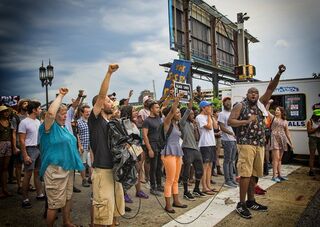Politics
Toward a Politics of Vulnerability
COVID-19 and the death of George Floyd.
Posted June 4, 2020

Speaking of President Trump’s lack of empathy for the victims of COVID-19, David Brooks wrote recently: “If we had a real leader, he would have realized that tragedies like 100,000 COVID-19 deaths touch something deeper than politics: They touch our shared vulnerability and our profound and natural sympathy for one another” (The New York Times, May 29, 2020). In his complementary column, “Did You Really Think Trump Would Mourn With Us?” Jamelle Bouie stated: “The president’s indifference to collective mourning is of a piece with a political movement that denies our collective ties as well as the obligations we have to each other” (The New York Times, May 29, 2020).
Since then, the death of George Floyd, an unarmed black man in the city where I live, has galvanized not only public grief but also public outrage. In response, President Trump tweeted: “When the looting starts, the shooting starts.” Queried about his intentions, he claimed that his words were merely descriptive and that he was unaware of their racist history.
Why President Trump may wish to resort to fueling national division is a subject for another post. My focus here is on the contrast between Brooks’ and Bouie’s conceptions of national connectedness, interdependence, and empathy with Trump’s reliance on the ideology of American individualism and autonomy. Each has roots in a particular psychology of human nature.
One view, which is echoed in Trump's statements and throughout Western culture, assumes that we are constituted as separate individuals, with needs, goals, and desires that we strive to fulfill for our own benefit. Perceived virtues in this system include: strength, self-reliance, and the acquisition of wealth and power. Such individuals may also seek to serve others in the guise of civic duty. This is what I will call the “autonomous” conception of human psychology.
The discipline of psychoanalysis, as founded by Sigmund Freud, has tended to support this view. In his emphasis on masculine aggression (the Oedipus complex as the crucible of individual as well as cultural development) Freud would have endorsed at least some of the above ideas. As a boy, he admired such figures as Napoleon and Alexander the Great and felt assured of his personal destiny.
Eastern and Native American cultures, grounded in family systems or clans, the veneration of ancestors, and the kinds of social bonds necessary for collective survival, offer a different model for selfhood, which many in the West find difficult to comprehend. Such social structures rely more on the subordination of individual personalities to group identity, aims, and goals. To be a good citizen or member of such a group means serving the community as a whole. I will call this the “collective” model of human psychology.
But there is another option. Post-Freudian psychoanalytic theory has de-emphasized the significance of the Oedipus complex as formative in the construction of masculine identity and society in favor of the preoedipal phase of development, centered on the infant’s relationship to its first caregivers and dependence on them for sustenance, loving attention, and life itself. In this view, as articulated by Judith Butler in her essay “Violence, Mourning, Politics,” (Precarious Life: The Powers of Mourning and Violence, Verso 2004), we do not enter the world as autonomous egos, much less as “rugged individuals,” prepared for the Darwinian struggle for survival. Rather, we are weak, wordless, and radically vulnerable.
Speaking of the process of mourning, she says: "What grief displays…is the thrall in which our relations with others hold us, in ways that challenge the very notion of ourselves as autonomous and in control…Let’s face it. We’re undone by each other. And if we’re not, we’re missing something” (23).
Butler draws on object relations and attachment theories, both of which affirm the deeply social and interactive aspects of human subjectivity. We do not enter the world as self-contained egos, but rather as beings-in-formation, dependent on the care of those who welcome us into the networks of relationship (familial, social, and cultural) that set the course of our future lives.
Such a concept of selfhood constitutes nothing less than a paradigm shift in the fields of psychoanalysis, political philosophy, and social psychology—one that focuses on our common humanity, rather than our national, racial, ethnic, or religious differences.
When faced with the growing crisis in this country—sparked by the brutal killing of George Floyd but rooted in historic conditions of racial inequality—our president called on the nation’s governors to “dominate” while threatening to deploy military force.
Autocratic rulers use the military against their own citizens. I will call this the politics of domination.
The politics of vulnerability, in contrast, calls for ways for us as a nation to mourn not only the devastating losses of COVID-19 but also that of George Floyd and all who have suffered or died as a result of racial trauma and injustice.




